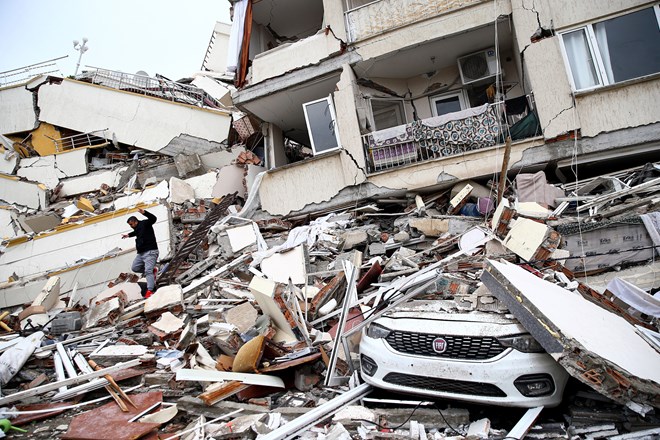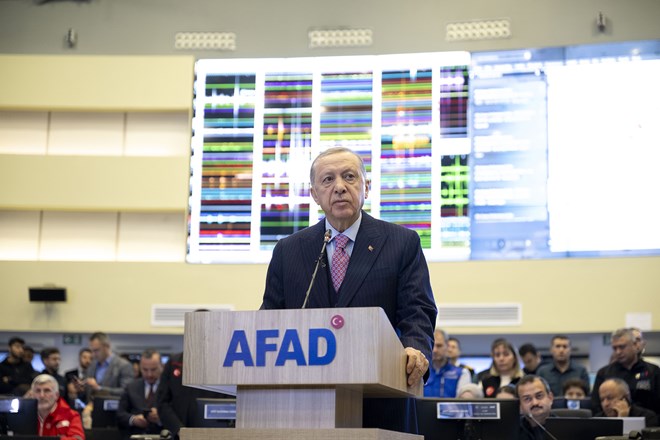
Monday February 6, 2023
Combined death toll rises above 1,500 after devastating earthquake
From CNN’s Kareem Damanhoury

Collapsed buildings and a damaged vehicle in the Iskenderun district of Hatay, Turkey, on February 6. (Sezgin Pancar/Anadolu Agency/Getty Images)
At least 1,504 people have been killed in Turkey and Syria, and thousands more injured, after a powerful 7.8 magnitude earthquake rocked southern Turkey early Monday.
In Syria, a total of at least 592 people have died, including 371 mostly in the regions of Aleppo, Hama, Latakia and Tartus, according to Syrian state news agency SANA, which also reported 1,089 injuries.
Meanwhile, the "White Helmets" group, officially known as the Syria Civil Defense, also reported at least 221 deaths and 419 injuries in opposition-controlled areas of northwestern Syria.
“Hundreds remain trapped under rubble,” the White Helmets added on Twitter.
In Turkey, at least 912 people have died and 5,385 people were injured, Turkey's President Recep Tayyip Erdoğan said in a televised address Monday.
Rescuers are working through the rubble of collapsed buildings to locate survivors, while NATO, the EU and 45 countries have offered assistance following the disaster.
Huge 7.5 magnitude aftershock hits Turkey, following deadly earthquake early Monday
From CNN's Brandon Miller
A major aftershock measuring 7.5 in magnitude struck Turkey at 1:24 p.m. local time (5:24 a.m. ET), after a devastating 7.8 magnitude earthquake rocked the region early Monday.
The aftershock is located approximately 95 kilometers (60 miles) north of the original quake that struck a little over nine hours earlier in southern Turkey, according to the United States Geological Survey (USGS).
This is the largest of the more than 30 aftershocks to strike so far. This is a preliminary estimate on the earthquake magnitude and is subject to change.
The 7.5 magnitude earthquake is considered an aftershock of the earlier 7.8 magnitude quake. All aftershocks are individual earthquakes, but as long as they are not stronger that the original, main quake, they are considered aftershocks.
This aftershock was extremely shallow, only 10 km deep, which worsens the shaking felt. The main quake was 17.9 km deep.
Before this morning’s 7.8, the 7.5 magnitude earthquake would have been the most powerful to strike Turkey since the 1999 Izmit quake that killed at least 17,000 people.
More than 1,500 people have died across Turkey and Syria following Monday's quake, with thousands more injured in both countries
White Helmet rescue workers in Afrin, Syria, on February 6. (Zana Halil/dia images/DVM/Abaca/Sipa USA/AP
NATO, EU and more than 40 nations offer help to Turkey following deadly quake
From CNN's Isil Tariyuce in Istanbul
The Turkish government has received offers of assistance from the the North Atlantic Treaty Organization (NATO), the European Union and 45 countries following the devastating earthquake that struck southern Turkey early Monday.
Turkish President Recep Tayyip Erdoğan announced the news in a televised address Monday, adding that at least 912 people have died in the country following the 7.8 magnitude quake.
Another 5,385 people have been injured and more than 2,400 people rescued from under the rubble of collapsed buildings.
The Turkish leader said there has been "heavy destruction" in cities, with around 2,818 buildings destroyed.
"We hope that we will overcome this disaster together as soon as possible," Erdogan added.
In neighboring Syria, at least 386 people have died, including 239 mostly in the regions of Aleppo, Hama, Latakia and Tartus, Syrian state TV reported earlier. The "White Helmets" group, officially known as the Syria Civil Defense, also reported at least 147 deaths in opposition-controlled areas of northwestern Syria. Hundreds more have been reported injured in Syria.
CNN's Kareem El Damanhoury contributed reporting.

Turkish President Recep Tayyip Erdogan speaks to the press at the Coordination Center of Disaster and Emergency Management Authority (AFAD) on February 6, in Ankara, Turkey. (Aytac Unal/Anadolu Agency/Getty Images)